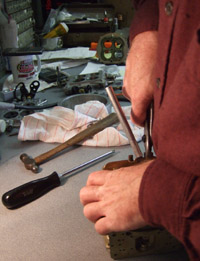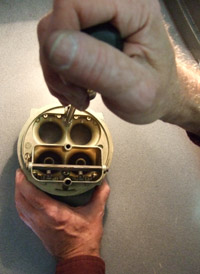|
About Us
|
 |
 |
 |
 |
 |
Basic Tuning of Holley Carburetors on Racing Engines
Basic tuning adjustments to your racing engine should be made in a specific order. This applies to the firing of a new engine, installation of a new or different carb, periodic checking of normal tuning adjustments, or searching for the cause of an engine performance problem.

Carburetor adjustments should be done in a specific order to keep from going around in a circle with your adjustments. First is fuel pressure. Assuming that you have an adjustable fuel pressure regulator, set the pressure to what’s recommended. This must always be done with the engine running. Next, set the float level to the bottom of sight hole on the side of each fuel bowl, with the engine running. Most regulators and needle/seat /float mechanisms require a small amount of fuel flow to set properly. The amount of fuel that an engine uses at idle is enough to satisfy this requirement, assuming that all of these components are in good working order. Next is idle mixture. With the engine up to full operating temperature, set your idle mixture needles for your best idle quality, usually with all of the needles out the same number of turns. You may need to make minor adjustments to the idle speed during the idle mixture adjusting to keep the idle speed in its normal range.
To recap, here’s the proper order:
| 1) ignition timing | |
| 2) fuel pressure | |
| 3) float levels | |
| 4) idle mixture and idle speed |

If you change your ignition timing in your search for better engine performance, you will probably need to readjust your idle mixture and idle speed. If you change your fuel pressure, either up or down, you should always check and reset the float levels. If you raise or lower your float levels, you may need to readjust your idle mixture and idle speed. All of these things are dependent on each other, and the performance of your engine depends on all of them being set correctly.
If you are dealing with an engine performance problem, and the adjustments discussed above do not correct the problem, then there are a number of other items that need to be checked. Carburetor related items include leaking power valves or power valve gaskets, calibration orifices clogged by dirt or other foreign matter, corrosion causing clogging or leaking, overheated fuel, contaminated fuel, stale fuel, cracked or shrunken o-rings on needle/seat assemblies, torn gaskets, use of the wrong gaskets (baseplate, metering block), inaccurate fuel pressure gauge, diaphragm in regulator too stiff from heat and age, kinked or collapsed fuel line, just to name a few. There is also a long list of engine related items that can cause problems. My experience has been that problems are often a result of multiple causes. Finding and correcting one cause may not totally solve the problem, so keep searching until you have corrected all of the items that are contributing to the problem. (Sorry, more easily said than done.) © Norm Schenck